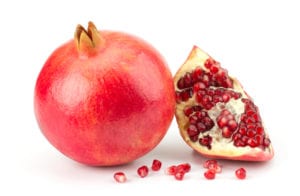Written by Angeline A. De Leon, Staff Writer. In this cross-over study, supplementing with 500 mL of pure pomegranate juice for seven days significantly improved blood pressure, fasting blood glucose, LDL-C, VLDL-C, and hsCPR compared to placebo.
 According to the National Cholesterol Education Program’s Adult Treatment Panel, metabolic syndrome is characterized by increased blood pressure, high blood sugar, excess abdominal body fat, and abnormal cholesterol and/or triglyceride levels. The direct link between metabolic syndrome and the risk of cardiovascular disease is well-established 1, the greater challenge for researchers now being the development of remedial and preventative strategies to counteract the symptoms of metabolic syndrome. Among the fruits and vegetables known to reduce the risk of cardiovascular disease, pomegranate, endowed with one of the highest levels of antioxidant polyphenols 2, may be one of the most beneficial functional foods. Several studies show that consumption of pomegranate juice may reduce inflammation, increase plasma triglyceride levels, and help protect cells against oxidative damage 3-5. Despite the recognized benefits of pomegranate juice on cardiometabolic indices, its application to the treatment of metabolic syndrome is still under investigation. In a 2017 study, researchers at the Urmia University of Medical Sciences in Iran conducted a controlled trial examining the impact of daily pomegranate juice intake on components of metabolic syndrome, including indices of inflammation and glycemic and lipid profiles.
According to the National Cholesterol Education Program’s Adult Treatment Panel, metabolic syndrome is characterized by increased blood pressure, high blood sugar, excess abdominal body fat, and abnormal cholesterol and/or triglyceride levels. The direct link between metabolic syndrome and the risk of cardiovascular disease is well-established 1, the greater challenge for researchers now being the development of remedial and preventative strategies to counteract the symptoms of metabolic syndrome. Among the fruits and vegetables known to reduce the risk of cardiovascular disease, pomegranate, endowed with one of the highest levels of antioxidant polyphenols 2, may be one of the most beneficial functional foods. Several studies show that consumption of pomegranate juice may reduce inflammation, increase plasma triglyceride levels, and help protect cells against oxidative damage 3-5. Despite the recognized benefits of pomegranate juice on cardiometabolic indices, its application to the treatment of metabolic syndrome is still under investigation. In a 2017 study, researchers at the Urmia University of Medical Sciences in Iran conducted a controlled trial examining the impact of daily pomegranate juice intake on components of metabolic syndrome, including indices of inflammation and glycemic and lipid profiles.
A total of 30 patients (mean age = 51.57 years) carrying a diagnosis of metabolic syndrome participated in a double-blinded, randomized crossover controlled trial. Every individual completed two seven-day treatment periods which were separated by a seven-day wash out period. Subjects were randomly assigned to two groups, the first group receiving a daily dose of 500 mL of pure pomegranate juice for one week and the second group receiving 500 mL of a placebo juice for the same time period. At the beginning and end of the study, researchers evaluated several measures, including blood pressure, fasting blood glucose, insulin levels, triglyceride levels, cholesterol [high-density lipoproteins cholesterol (HDL-C), low-density lipoproteins cholesterol (LDL-C), very low-density lipopproteins cholesterol (VLDL-C)], and high sensitivity C-reactive protein (hs-CRP, marker of chronic inflammation predictive of cardiovascular disease).
While no significant differences were found between the two groups in fasting blood glucose, insulin levels, and insulin resistance, results showed that pomegranate juice, in comparison to placebo, produced significant reduction of systolic and diastolic blood pressure (p = 0.00) and hs-CRP (p = 0.018). However, relative to the baseline condition, consumption of pomegranate juice also led to increased triglyceride levels (p = 0.030) and VLDL-C (p = 0.014).
In general, findings indicate that pomegranate juice has selective benefits in relation to the cardiometabolic components of metabolic syndrome. Although positively impacting blood pressure and hs-CRP inflammatory index, daily consumption of pomegranate juice may also induce potentially harmful increases in triglyceride and VLDL-C levels. Therefore, long-term clinical studies are needed to better understand the complex effects of pomegranate juice on lipid profile and indices of inflammation in metabolic syndrome and cardiovascular disease.
Source: Moazzen, Hossein, and Mohammad Alizadeh. “Effects of Pomegranate Juice on Cardiovascular Risk Factors in Patients with Metabolic Syndrome: a Double-Blinded, Randomized Crossover Controlled Trial.” Plant Foods for Human Nutrition 72, no. 2 (2017): 126-133.
© Springer Science+Business Media New York 2017
Posted September 12, 2017.
Angeline A. De Leon, MA, graduated from the University of Illinois at Urbana-Champaign in 2010, completing a bachelor’s degree in psychology, with a concentration in neuroscience. She received her master’s degree from The Ohio State University in 2013, where she studied clinical neuroscience within an integrative health program. Her specialized area of research involves the complementary use of neuroimaging and neuropsychology-based methodologies to examine how lifestyle factors, such as physical activity and meditation, can influence brain plasticity and enhance overall connectivity.
References:
- Szajdek A, Borowska E. Bioactive compounds and health-promoting properties of berry fruits: a review. Plant Foods for Human Nutrition. 2008;63(4):147-156.
- Sahebkar A, Simental-Mendía LE, Giorgini P, Ferri C, Grassi D. Lipid profile changes after pomegranate consumption: A systematic review and meta-analysis of randomized controlled trials. Phytomedicine. 2016;23(11):1103-1112.
- Hosseini B, Saedisomeolia A, Wood LG, Yaseri M, Tavasoli S. Effects of pomegranate extract supplementation on inflammation in overweight and obese individuals: A randomized controlled clinical trial. Complementary therapies in clinical practice. 2016;22:44-50.
- Shishehbor F. Effects of concentrated pomegranate juice on subclinical inflammation and cardiometabolic risk factors for type 2 diabetes: a quasi-experimental study. International journal of endocrinology and metabolism. 2016;14(1).
- Adams LS, Seeram NP, Aggarwal BB, Takada Y, Sand D, Heber D. Pomegranate juice, total pomegranate ellagitannins, and punicalagin suppress inflammatory cell signaling in colon cancer cells. Journal of Agricultural and Food Chemistry. 2006;54(3):980-985.
